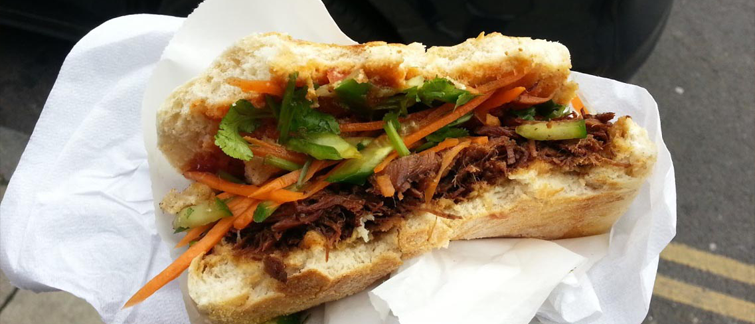Rou jia mo, sometimes spelled roujiamo (Chinese: 肉夹馍; pinyin: ròu jīa mó), meaning “meat burger” or “meat sandwich,” is a street food originating from Shaanxi Province and now widely consumed all over China. The meat is most commonly pork, stewed for hours in a soup consisting of over 20 kinds of spices and seasonings. Although it is possible to use only a few spices (which many vendors do), the resulting meat is less flavourful. There are many alternative fillings available, for example in Muslim areas in Xi’an, the meat is usually beef (prepared Kabob style and seasoned with cumin and pepper), and in Gansu it is often lamb. The meat is then minced into fine shreds or chopped, then mixed with coriander and mild peppers, and stuffed in “Mo”, a type of flatbread. An authentic Mo is made from wheat flour which is made into a batter and stirred repeatedly for an extended period of time and then baked in a clay or mud oven, but now in many parts of China, Mo is made in a frying pan or a pressure cooker (some even substitute the real Mo with a steamed bun), and the resulting taste diverges significantly from the authentic clay oven-baked version. Depending on the types of spices used to cook the meat and the way the bread is made, the taste of rou jia mo (roujiamo) can vary greatly from vendor to vendor.
Rou jia mo costs around 6 yuan in most parts of China[citation needed] and is considered China’s answer to the Western hamburger and meat sandwiches. In fact, Rou Jia Mo could be the world’s oldest sandwich or hamburger, since the history of the bread dates back to the Qin Dynasty (221 BC – 206 BC) and that of the meat to the Zhou Dynasty (1045 BC to 256 BC). Contrary to popular misconceptions, rou jia mo is not a street food unique to Muslims. It was invented first by the Han Chinese, while Muslims simply substituted pork with barbecued beef or lamb due to Islamic restrictions on eating pork[citation needed].
Rou jia mo (Roujiamo) can be found in many street food vendor stalls or near Chinese mosques. It is called rou jia mo by some vendors, whereas others might call it la zhi rou jia mo (or lazhi roujiamo, Chinese: 腊汁肉夹馍), which simply means rou jia mo with special gravy; yet some others call it bai ji la zhi rou jia mo (or baiji lazhi roujiamo), which means rou jia mo with special gravy in a bread (bai ji refers to the type of bread).
